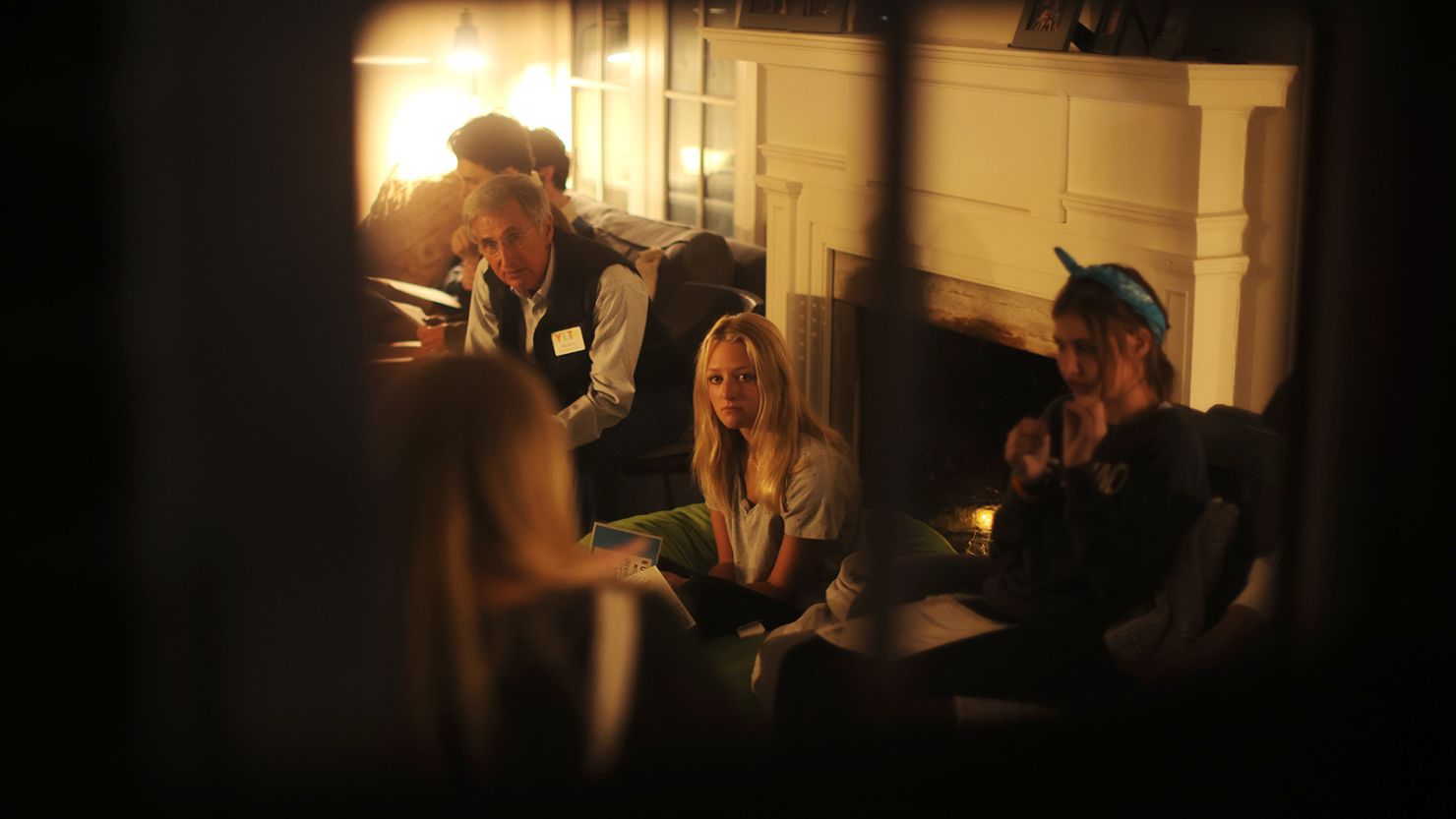A roomful of teenagers — some old friends and some strangers — stood with their hands, feet or backs together and their eyes closed.
“We are never alone in this world,” says Davis Cooke, 18, a high school senior and a founder of the group, who was leading the teens in meditation. “We are connected to larger communities that support us.”
It isn’t the kind of Wednesday night you would expect to excite teens after finishing homework and after-school activities, but this group of eight said it looks forward to the monthly mental health sessions with church leaders at Myers Park Presbyterian Church in Charlotte.
Many high schoolers are affected by what experts have called a teen mental health crisis, according to a survey released by the US Centers for Disease Control and Prevention in March.
Overall, more than a third of high school students in the United States experienced poor mental health at least most of the time during the Covid-19 pandemic, the CDC survey found. More than 2 out of 5 students had felt persistent sadness or hopelessness that caused them to stop doing some usual activities. About 1 in 5 seriously considered suicide, and about 1 in 10 students had attempted suicide.
“(The teens) realized this is a national emergency, and this is about life and death,” said Michelle Thomas-Bush, associate pastor for youth at Myers Park Presbyterian. “If they can give them some resources … for the chronic stress they deal with, then that may be a lifelong gift.”
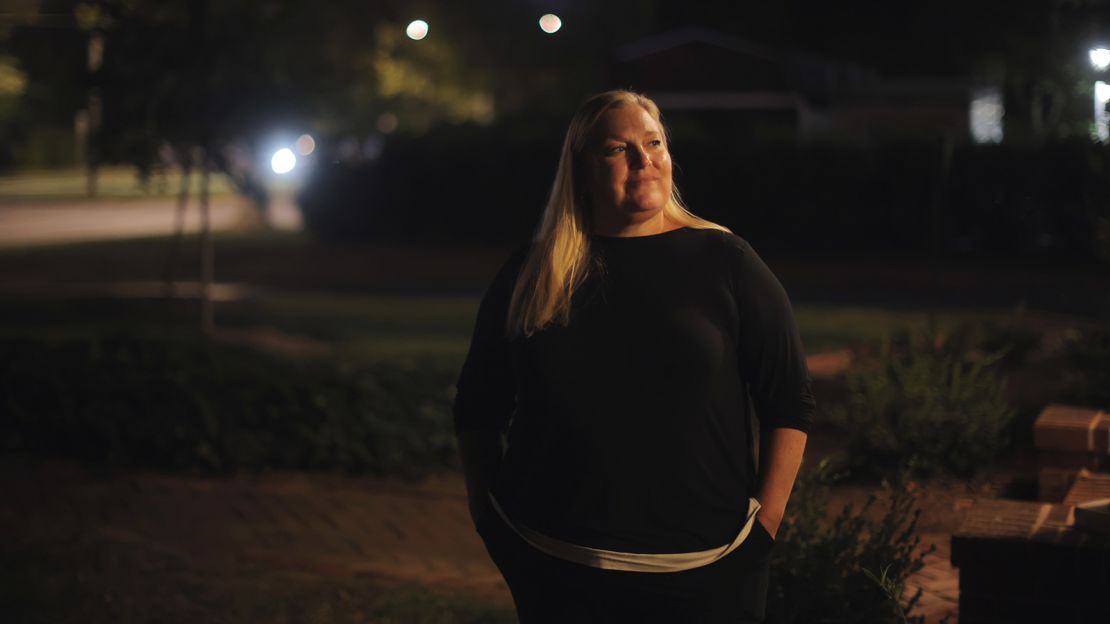
The church program came together in 2021 after a longer history of occasional mental health programming. That’s when church leadership learned of the number of teenagers in the area who had died by suicide — and of the members of its own congregation who had been touched by it. While eight teenagers ages 14 to 18 attended the recent September meeting, about 40 teens have participated in the program, and 12 have become certified advocates.
The advocates undergo training by church leadership in skills such as problem-solving, breathing techniques, self-compassion, mindfulness and meditation. Then they can bring these tools to teach their peers at the monthly check-ins — with the guidance of adults who are always in the room to provide structure and offer support.
“This past year, I’ve learned that mental health is something that most high schoolers are dealing with. Sometimes we overlook it, we think that everyone else is doing OK, when really, they may not be,” one student at the meeting said. “Check on those that you think are doing OK. They might not be.”
How to get help
Most of the teens attending the September meeting shared that either they had lost someone to suicide, received a phone call from a friend who was considering suicide, had suicidal ideation (thinking or planning about suicide) or a combination of the three.
The mental health check-ins are meant to provide support to teens in crisis, connect their friends with adults who can intervene, and help students who are feeling OK invest in their mental health, Thomas-Bush said.
“We’re all going to have a crisis, we’re all going to have a hard day,” Thomas-Bush said. “We want to give them the life toolsand the resources so that they can face it.”
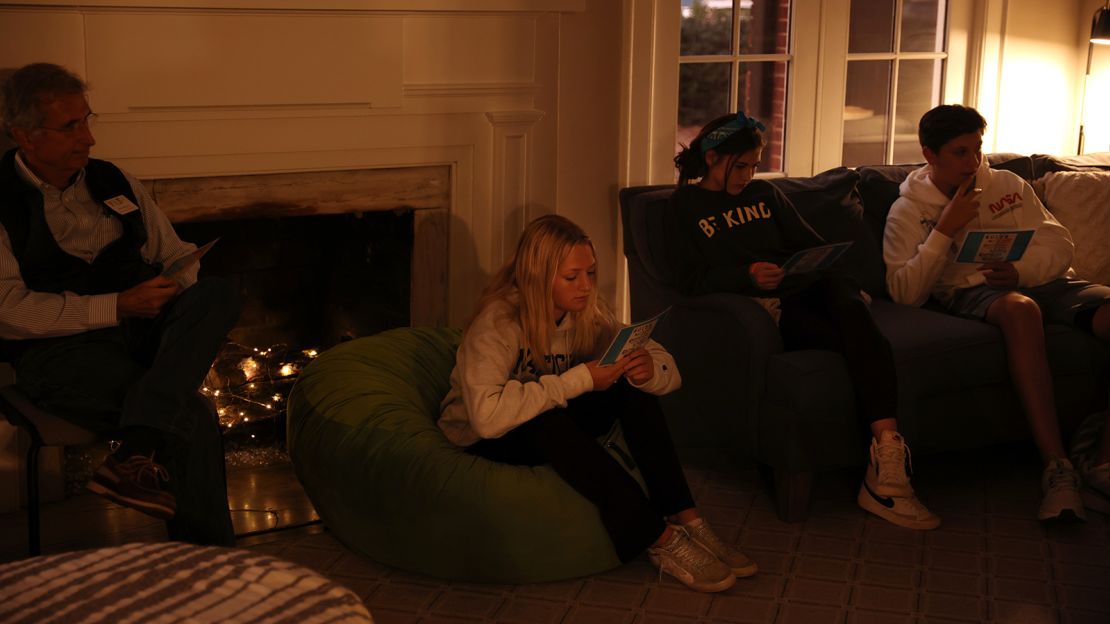
Checking in
One of the most important parts of the evening was time set aside for the teens to check in on one another.
It happened first with the group slouched on sofas, chairs and beanbags. They went one by one, with a card listing and categorizing different words to describe emotions, to say how they were feeling that day.
Words such as stress were clarified to mean frustration, and upon discussion someone realized they weren’t just content — they were joyful.
Then they moved around a table full of Chipotle bowls, and eating together helped them to break into smaller groups and open up more with each other. They shared laughs and giggles, gripes and groans about school, family and friends.
To get the vulnerability that group members need to support one another, Thomas-Bush said the adults running the group make sure the teens can share time talking about the hard stuff as well as letting loose and having fun.
A teen at the session in September said she came to her first meeting because it was important, but she kept returning because she had so much fun and saw such a benefit in getting together to share with her friends about their mental health.
Another girl agreed, saying that she usually sees people keep quiet about their feelings because talking about them could be seen as attention seeking. But now that she can come together with friends from different schools, she feels more confident to speak directly about her experiences.
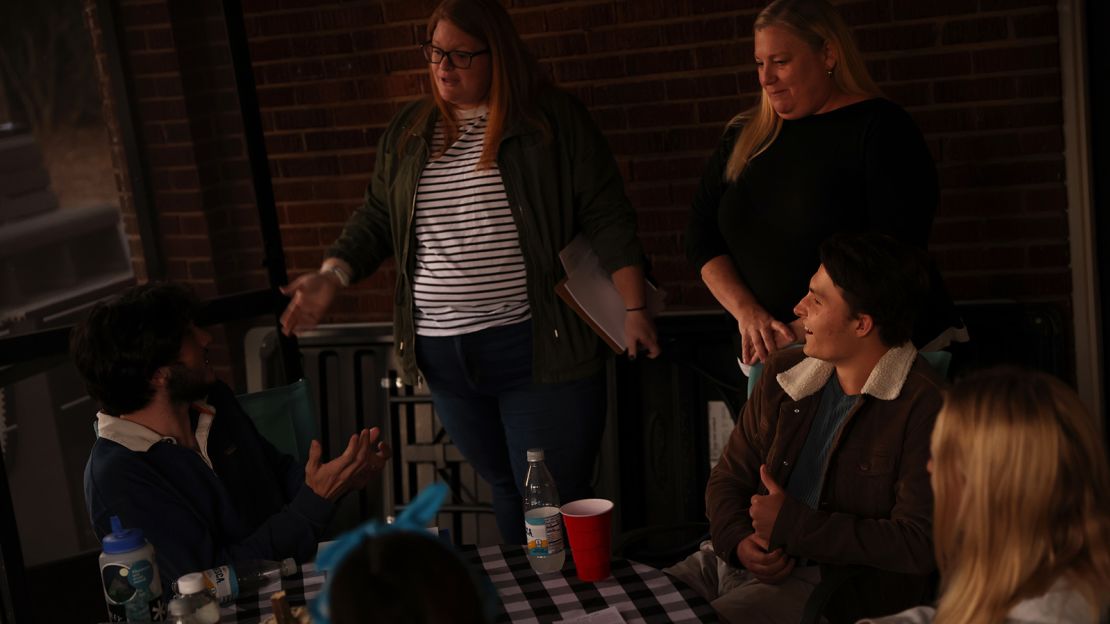
Using tools in everyday life
Let’s talk about something that brings you stress, Thomas-Bush told the teens. It was no surprise that college came up.
The teens came up together with a worst-case scenario: They don’t get into any of the colleges to which they apply. Then they learned how to decatastrophize, a psychological tool that explores the reality of a feared situation to lessen the imagined danger, according to the American Psychological Association.
The consequences of not getting into college would be that it would affect their future, but there were things they could do about it, the teens discussed from their seats around the cozy room. They could take a gap year to volunteer, do a job abroad or intern in their future career path — and then try again.
Now that they knew how to fix the problem, what were the actual chances of the worst-case scenario coming true? After some thought, they decided that while they might not get into their top-choice school, they may get into some of their other choices.
Decatastrophizing is one of the tools group members have practiced to take back into everyday life.
One teen mentioned that her parents often ask her if something she is worrying about won’t matter in three minutes, three hours, three days, three months or three years to help her keep perspective.
Cooke, a group founder, countered, saying that while it’s good to keep perspective, even short-term pain deserves to be felt.
“Maybe it won’t matter in three days, but I still might need a minute,” Cooke said.
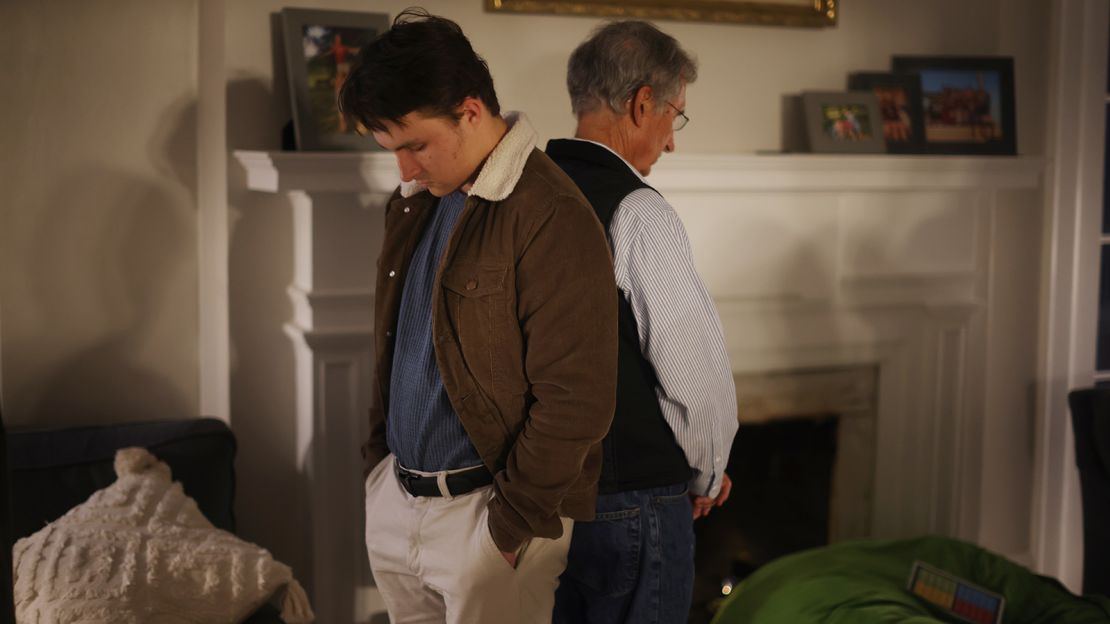
Setting boundaries
Asked what parents should know about kids, many students said sometimes teenagers just need space to open up about their feelings. They also suggested that parents may need to learn how to use these psychological tools, too.
Psychologist Lisa Damour, author of “The Emotional Lives of Teenagers: Raising Connected, Capable, and Compassionate Adolescents,” suggested a few things to such a list. First, adults need to make sure that teenagers, as good as they are at supporting one another, don’t feel completely responsible for the mental well-being of their peers.
“It’s hard enough to be a teenager, and I would never want to feel that a teenager believes that their friend’s life is in their hands,” said Damour, who’s based in Ohio.
“Though these groups are willing to help one another, they are not always equipped with the tools that mental health professionals are trained to use,” Chicago-based psychologist John Duffy added. “The well-being of teenagers who need professional attention can sometimes be in the hands of fellow teenagers.”
He said it is critical for such groups to have a trained professional adult in attendance.
“That’s why there are adults in the room, because they can let us know, and we can take that from them,” Thomas-Bush said. “We’re not responsible for doing therapy, we are not responsible for helping them fix the situation. We’re not responsible for protecting them every minute of the day. We are responsible for letting the parents know when we know they’re going to be harming themselves.”
That’s where the second thing Damour wants families to know comes into play: Honor teens’ support abilities while teaching them how to go to adults for help so they or their friends can get more professional support when they need it.
“There is some work to be done talking with teenagers about whether they would feel comfortable alerting an adult, what might get in their way, what adults can do to make themselves more accessible to teens when they are worried about their friends,” she added.
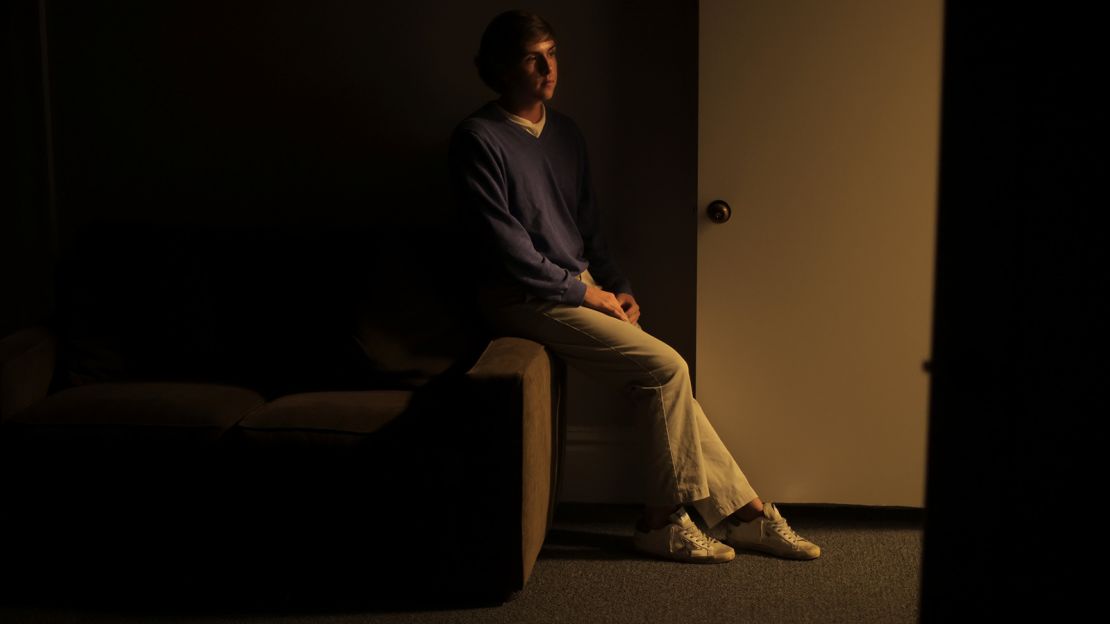
The last bit of salsa had been scraped out of the bowl and students were piling into their parents’ cars as Cooke looked out onto the church parking lot.
One of the girls at the session seemed quieter than usual, he said. He decided he would check with her later in private and ask how she was feeling.
Cooke went back to talk to Thomas-Bush, who was locking up the church, so he could get her help supporting his friend.

